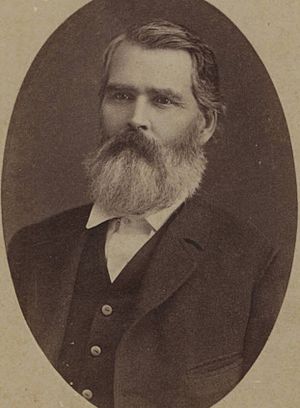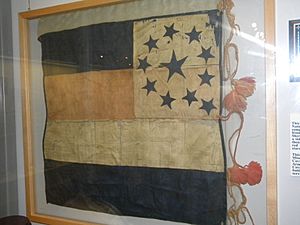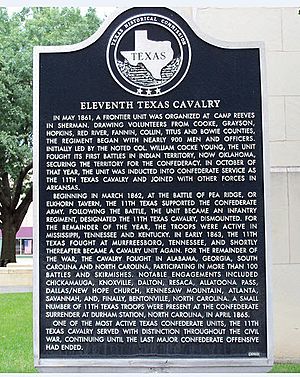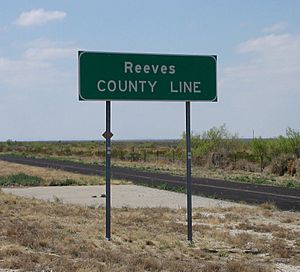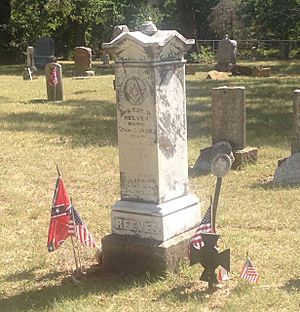George R. Reeves facts for kids
George Robertson Reeves (born January 3, 1826 – died September 5, 1882) was an important leader in Texas. He served as the Speaker of the House for the State of Texas. He was also a Colonel in the Confederate Army during the American Civil War. Reeves was a key person in setting up Grayson County, Texas. He worked there as a Sheriff and also collected taxes.
Contents
Personal Life of George Reeves
George Robertson Reeves was born in Hickman County, Tennessee. In 1844, he married Jane Moore while living in Arkansas. They had 12 children together. Seven of their children were still alive when he passed away in 1882.
George R. Reeves gave 10 acres of his land in Pottsboro, Texas. This land was used to create Georgetown Cemetery. His baby daughter, Mary, was the first person buried there.
One of Reeves's younger sons was Alvin Robertson Reeves (1872-1946). Alvin won the 1938 Pugsley Medal. He received this award for his work as the director of State Parks in Oklahoma. Alvin Reeves helped create the bill that started the State Game and Fish Commission in Oklahoma. He also bought the first lands that became state parks in Oklahoma.
Career and Public Service
Besides farming, one of Reeves's first jobs in Grayson County, Texas was collecting taxes. He did this from 1848 to 1850. He enjoyed public service so much that he became the Sheriff of Grayson County in 1850. He served as Sheriff until 1854.
Reeves in the Civil War
In May 1861, the American Civil War had just begun. Reeves put together a group of soldiers for the 11th Regiment of the Texas Cavalry. Even though Grayson County voted against leaving the United States, Texas decided to join the Confederacy.
Reeves then gave land to create Camp Reeves. This camp supported the 11th Texas Cavalry and the Confederate cause. Reeves started as a Captain. He was later promoted to Colonel after the first commander died. Colonel George R. Reeves led the 11th Cavalry longer than any other officer.
The Texas 11th Cavalry fought in about 150 battles and small fights during the war. It is said that out of 500 men who fought, less than 50 returned home. Colonel Reeves commanded the 11th Cavalry in many big battles. These included the Chattanooga campaign, Wheeler's October 1863 Raid, the Atlanta Campaign, and the Battle of Chickamauga. The Battle of Chickamauga was the second bloodiest battle of the war. It was also the biggest victory for the Confederate States.
Reeves left his military position before the war ended. He had disagreements with his commanding officers. He felt he could help his country better in a different way. His resignation was approved by high-ranking generals.
Post-War Politics
Back in Texas, Reeves became active in groups for war veterans. He also joined the Old Settlers' Association in Grayson County. Reeves was elected to the Texas State Legislature several times. He served in 1866, 1873, 1878, and 1880.
In 1881, he became the Speaker of the House of Representatives for the State of Texas. While he was Speaker, the legislature helped create the University of Texas in Austin.
Death and Lasting Impact
In 1882, while visiting his home, Reeves was bitten by a dog that had rabies. Family stories say he saw a child in danger from the dog. He jumped off his horse to protect the child and was bitten.
In his final days, Reeves was kept in a special shed. This was to protect him from the effects of the disease. He died from rabies in September 1882. This was only three years before a vaccine for rabies was discovered. He is buried in Georgetown Cemetery in Pottsboro, Texas, on land he once owned.
Two years after he died, a large county in West Texas was named after him. Reeves County, Texas is home to the city of Pecos, Texas. The Masonic Lodge in Pottsboro was also named after him. So was a local group called the Sons of Confederate Veterans.


